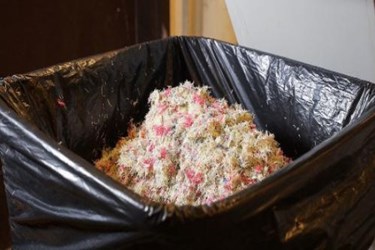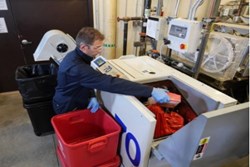Utah Hospital Saves Money And The Environment By Treating Its Own Medical Waste On Site

State-of-the-Art Blue Mountain Hospital in Blanding Eliminates Need for Incinerator with Innovative SteriMed® On-site Medical Waste Processor
Blanding, UT /PRNewswire/ - While consumer advocate Erin Brockovich and the northern Salt Lake City, Utah community of Foxboro loudly protest the human health and environmental hazards of a Stericycle medical waste incinerator in their backyard, the rural community of Blanding in southern Utah quietly disposes of its own medical waste - quickly, cost-effectively and without harmful emissions to the community in which it operates.

Located near two Native American reservations and Four Corners, and at the gateway to more state and national parks than anywhere else in the U.S., Blue Mountain Hospital in Blanding, Utah, recently installed an onsite medical waste treatment system manufactured by SteriMed® Medical Waste Solutions. This medical waste processor is a clean-air hybrid technology appliance that converts medical waste into ordinary trash using a biodegradable, disinfectant-based process. The SteriMed® System 70 -- comparable in size to a small, walk-up, self-service photocopier -- simultaneously shreds and disinfects medical waste using an environmentally-friendly, EPA-registered disinfectant called SterCid®. The room-temperature process creates no toxic output. After treatment of the medical waste, the resulting solid waste material is disposed of alongside regular trash in accordance with solid waste regulations. The end product, called Ploof™, which looks like confetti, is reduced to 10 percent of the volume of the original waste, and is completely safe for disposal in the community landfill. This volume reduction also significantly reduces the hospital's solid waste landfill footprint.
Most of Blue Mountain Hospital's annual 12,000 pounds of medical waste comes from its dialysis center, labor and delivery ward, laboratory and surgical center. The waste consists of plastic tubing, artificial kidneys (dialyzers) which have been contaminated with blood and plasma, glass and plastic vials used for blood and lab sample collection, syringes, sharps (needles) containers, tissue and other organic material resulting from surgical procedures.
Prior to using the SteriMed® Systems unit, Blue Mountain Hospital disposed of its medical waste the same way that the vast majority of the nearly 6,000 U.S. hospitals do. It hauled its waste several hundred miles– often across state lines – to the nearest medical waste incinerator, which would burn the waste, generating airborne pollutants such as dioxins, furans and dangerous compounds. Blue Mountain Hospital, along with the Utah Navajo Health System (UNHS) paid as much as $5,000each month to haul and incinerate of their medical waste using offsite incineration. Associated costs included a driver's salary, gas and insurance for the transport vehicle, and contract fees with incinerator companies. Often times the medical waste generated at the hospital would be stored for up to 30 days at the hospital before being transported to the incinerator. This on-site storage process also contributed to increased risk of healthcare acquired infection (HAI) within the hospital, whose goal is to provide a healthy environment for its patients.
"It was our only option," said Donna Singer, CEO of Blue Mountain Hospital. "The costs to us were huge, not only financially but in terms of human risk and environmental hazards. Storing our waste had potentially serious consequences, including the spread of infectious disease and the wind blowing the toxic waste onto city streets. One time our van was hit while in transit and medical waste was strewn all over the highway."
With the System 70 unit, Blue Mountain's medical waste disposal costs have plummeted to $2,000 per month, a cost that will disappear once the machine is paid off. "We wanted a SteriMed unit for the cost savings alone," said Trent Herring, Environment of Care Director at Blue Mountain Hospital. "The additional benefits to the environment and in terms of infection control, not to mention the service we are providing to our community health clinics, make it one of the most valuable assets in our hospital."
The SteriMed® method of medical waste treatment has been so successful for Blue Mountain Hospital that the hospital invited surrounding medical clinics, healthcare providers, and the community to bring their medical waste to Blue Mountain for disposal. Blue Mountain Hospital is closely aligned with a larger health system that includes four clinics, provides medical services to members of the Navajo and Ute reservations, and offers programs for patients with diabetes and other chronic diseases. These outlying facilities generate an additional 6,000 pounds per year, all of which was also being transported long distances to a medical incinerator.
Now medical waste that is generated at the hospital and also brought in from the outlying healthcare providers is transported through the halls of the small hospital to the equipment room, where the SteriMed® System 70 unit is installed. A machine operator loads the bags of medical waste, including sharps containers, into the waste receiver of the System 70. To safeguard the operator two buttons must be pushed simultaneously to close the lid. Then the operator pushes the start button to begin an automated, emission-free, process. The complete cycle takes about 20 minutes, after which the treated waste, Ploof™, is automatically dumped into a plastic trash receptacle and wheeled out to the hospital's trash collector. "We don't have infectious waste storage issues any more," says Herring. "We dispose of our medical waste as needed – twice a day, once a week, before it starts to accumulate."
"Blue Mountain Hospital is a perfect example of a hospital that has adopted an environmentally and cost-effective alternative to incineration by using a clean air hybrid technology like SteriMed® which not only cut costs and health risks, but also provides tremendous environmental benefits to the communities within Utah," said SteriMed® Systems CEO Dwight Morgan. "In addition to the environmental benefits of disposing of medical waste cleanly, safely and at the source, more and more healthcare companies are creating their own green initiatives. It's no longer good enough for hospitals to be great healthcare providers. They must also be great community partners and environmental stewards."
SteriMed has units in operation throughout the contiguous U.S. and overseas including the U.S. Virgin Islands, Hawaii, Guam,Curacao, Spain, Ireland, Russia, Portugal, Israel, and on U.S. Navy ships. SteriMed® was also used during the Haitiearthquake recovery efforts to provide emergency waste treatment. In addition to hospitals like Blue Mountain, SteriMed® units are used in other healthcare facilities such as dialysis centers, surgical centers, clinical laboratories, blood banks, veterinary offices, medical office buildings and any healthcare facility that generates medical waste, including sharps containers.
"SteriMed Systems is an environmentally friendly solution to the global problem of waste incineration," said Dwight Morgan.
About Blue Mountain Hospital
The non-profit Blue Mountain Hospital, Inc. is an 11-bed critical access hospital serving the healthcare needs of the 15,000 residents of San Juan County in southeastern Utah. Located in Blanding, Utah, the hospital opened in 2009 and achieved accreditation from The Joint Commission on Accreditation of Healthcare Organizations (JCAHO) in 2013. The hospital provides emergency services, radiology, laboratory, general surgery, labor & delivery, and general hospital services. It also operates an eight-chair dialysis center, which is fairly unique for an independent rural hospital, and an in-house pharmacy that features the latest technology in medication dispensing. The hospital works closely with Utah Navajo Health System (UNHS), and its network of four clinics in San Juan County. The clinics refer patients to Blue Mountain Hospital for hospital and surgical services. For more information visit www.bmhutah.org.
About SteriMed Systems
SteriMed® Medical Waste Solutions was founded in 2002 in response to EPA and WHO reports which concluded that burning medical waste in incinerators generates the largest amount of the super toxins, dioxins, and is the third largest source of mercury in the environment. SteriMed® developed its line of innovative medical waste processors along with its unique biodegradable disinfectant. Based in Farmington Hills, MI, SteriMed® manufacturers two units, the smaller System 15 and the larger System 70. In addition the company developed its proprietary EPA-registered SteriCid® disinfectant. SteriMed® machines and SteriCid® are approved for use in all 50 states. For more information visit www.SteriMedSystems.com. SteriMed is a member of Practice Greenhealth (www.practicegreenhealth.com), the leading healthcare industry organization dedicated solely to continued improvement in the environmental impact of healthcare.
Note to editors: Photos and b-roll of Blue Mountain Hospital and the SteriMed® unit are available at www.SteriMedSystems.com, or by contacting Joanna Brody, 310-582-0085, Email.
Read more news from SteriMed Systems.
Source: SteriMed Systems and Blue Mountain Hospital
Copyright 2013 PR Newswire. All Rights Reserved